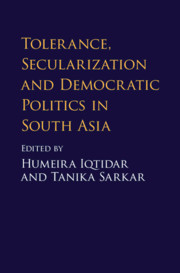Book contents
- Tolerance, Secularization and Democratic Politics in South Asia
- Tolerance, Secularization and Democratic Politics in South Asia
- Copyright page
- Dedication
- Contents
- Figures
- Contributors
- 1 Introduction
- 2 Languages of Secularity
- 3 Secularization of Politics: Muslim Nationalism and Sectarian Conflict in South Asia
- 4 Temple Building in Secularising Nepal: Materializing Religion and Ethnicity in a State of Transformation
- 5 Secularization and Constitutive Moments: Insights from Partition Diplomacy in South Asia
- 6 Tolerance in Bangladesh: Discourses of State and Society
- 7 In the Void of Faith: Sunnyata, Sovereignty, Minority
- 8 Pillayar and the Politicians: Secularization and Toleration at the End of Sri Lanka’s Civil War
- Index
- References
1 - Introduction
Published online by Cambridge University Press: 05 July 2018
- Tolerance, Secularization and Democratic Politics in South Asia
- Tolerance, Secularization and Democratic Politics in South Asia
- Copyright page
- Dedication
- Contents
- Figures
- Contributors
- 1 Introduction
- 2 Languages of Secularity
- 3 Secularization of Politics: Muslim Nationalism and Sectarian Conflict in South Asia
- 4 Temple Building in Secularising Nepal: Materializing Religion and Ethnicity in a State of Transformation
- 5 Secularization and Constitutive Moments: Insights from Partition Diplomacy in South Asia
- 6 Tolerance in Bangladesh: Discourses of State and Society
- 7 In the Void of Faith: Sunnyata, Sovereignty, Minority
- 8 Pillayar and the Politicians: Secularization and Toleration at the End of Sri Lanka’s Civil War
- Index
- References
Summary
- Type
- Chapter
- Information
- Publisher: Cambridge University PressPrint publication year: 2018



